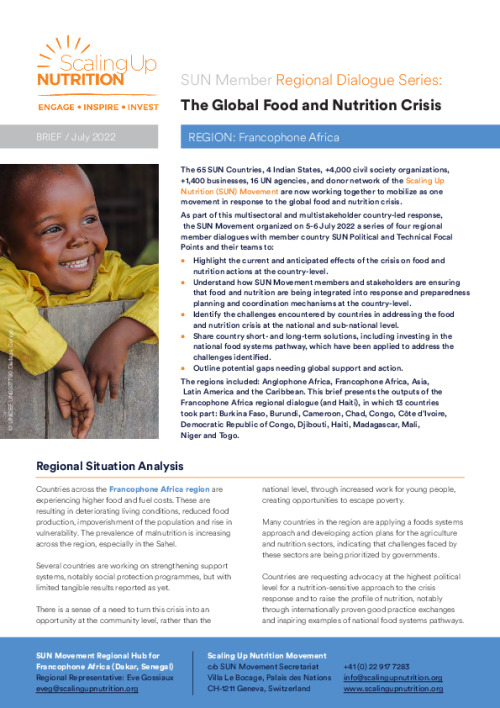
Cameroon
Joined Scaling Up Nutrition (SUN) Movement
February 2013
National multi-stakeholder platform for nutrition
Inter-ministerial Committee for the Fight Against Malnutrition (CILM)
Sun Government Focal Point/Country Coordinator
Cécile Patricia Ngo Sak, Assistant Director, Ministry of Public Health
Country nutrition status 2022
- Yes
- In process
- No
- Costed
- M&E framework
National multi-stakeholder platform (MSP)
National nutrition plan
Advocacy and communications framework/plan
Subnational nutrition coordination mechanism
SUN networks in-country presence
Finance for nutrition
Country priorities 2022
2022 Shared country good practice
Innovative approaches to financing nutrition at the local level
Innovative approaches to financing and fundraising
Advocacy with local elected officials (mayors and municipal advisers) made it possible to provide a budget line to finance activities in favour of nutrition at the municipal level.
Progress towards SUN 3.0 Strategic Objectives (SO)
Cameroon is on track to address growth retardation, although the absolute number of affected children remains high. On the other hand, the rate of overweight and obesity among children is increasing, from 6.7% in 2014 to 11% in 2018. Multiple Indicator Cluster Surveys (MICS) planned for 2023 will show the latest trends in obesity. Food security data is analysed twice a year. It is collected through the Ministry of Water and Energy, despite the lack of functionality of the water information system (SIE), SMART-SENS surveys, demographic and health surveys (EDS) and the WHO/UNICEF Joint Monitoring Programme for Water and Sanitation, among others.
1) Development of the Multisector Nutrition Development Plan (PMDN) in Cameroon and the strategic advocacy and communication plan; 2) Establishment of a community feedback system on good nutrition practices through listeners' clubs and broadcast of community multimedia programmes featuring testimonies of 'positive deviants'; 3) Advocacy with local elected officials (mayors and municipal advisers) for local governance in favour of nutrition. To date, more than 100 municipalities have made a commitment to allocate at least 1% of their budget to nutrition-sensitive activities.
To build capacity in nutritional governance, the Inter-ministerial Committee for the Fight Against Malnutrition (CILM) continued its collaboration with the network of academics to improve the application of harmonised training programmes for nutritionists. The content of the modules will be finalised in 2023. The codification of the body of nutritionists in the general statute of the public service is also in progress.
The CILM's institutional coordination is ensured by the General Secretariat of the Prime Minister's Office and the technical coordination by the Sub-Directorate for Food and Nutrition, a structure of the Ministry of Public Health. A new programme called 'Promotion of Health and Nutrition' (No 046), financed by the state budget, has existed within the Ministry of Health since 2022. Similarly, other sectors have dedicated budget allocations to fund nutrition-sensitive activities. This programme allows the activities of stakeholders to be aligned with national priorities, and the common framework makes it possible to define the responsibilities of each actor, as well as to monitor progress towards the achievement of objectives.


